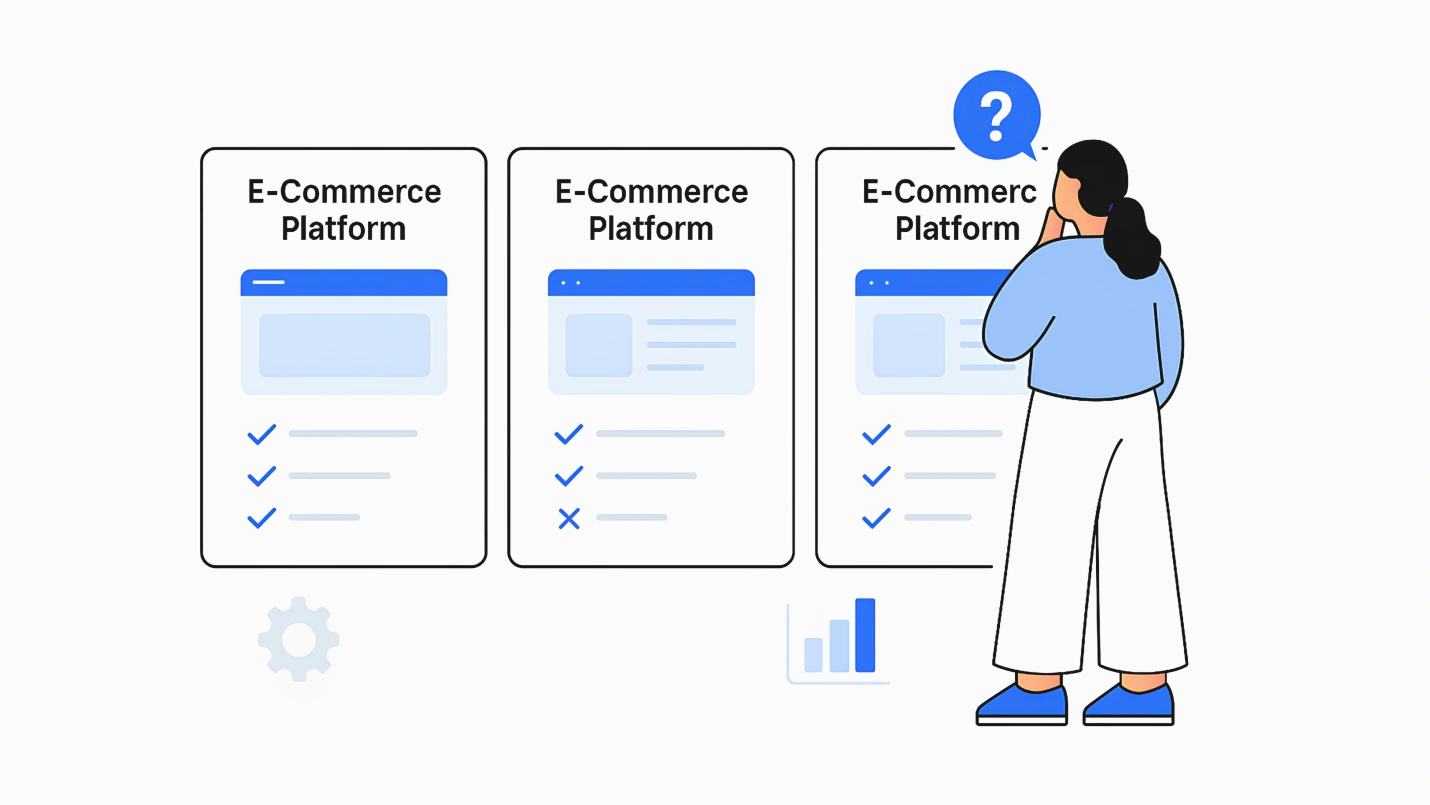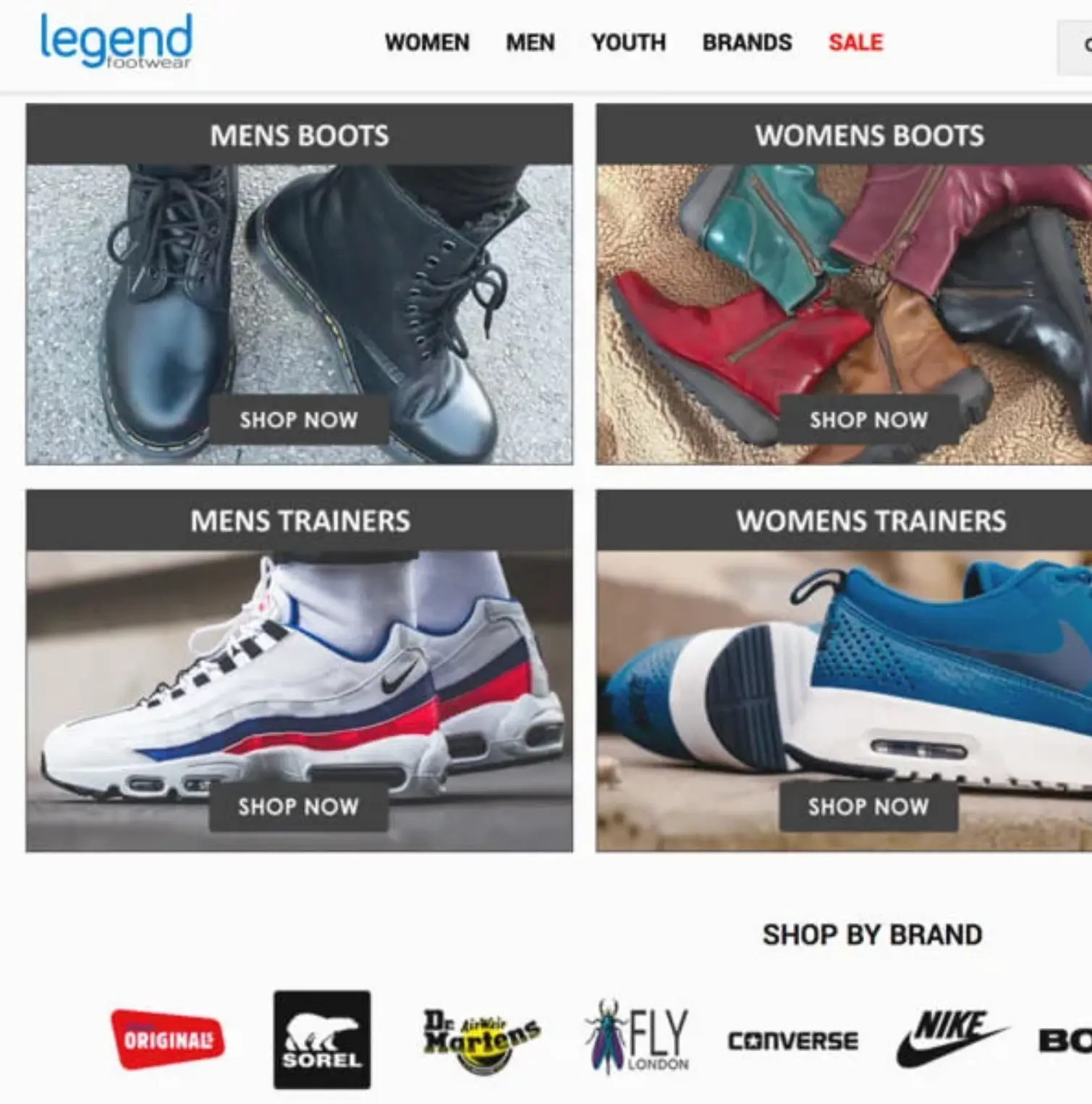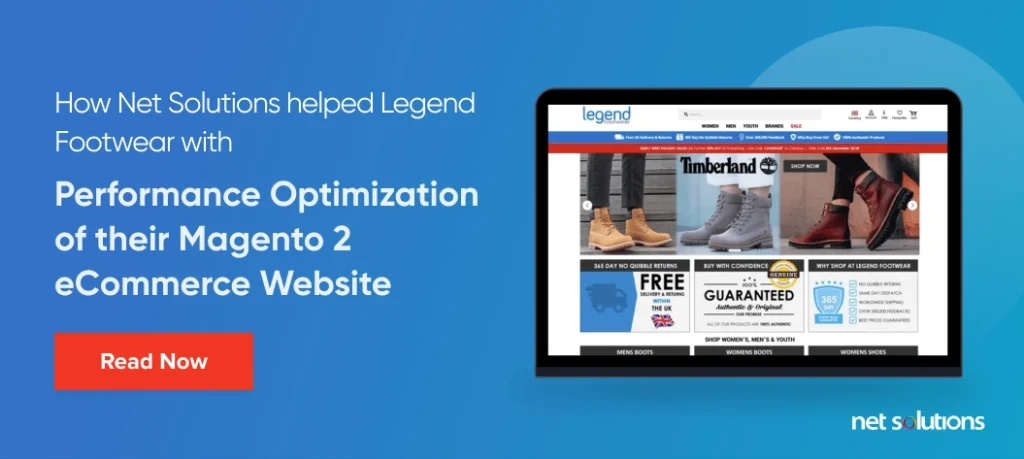The rise of eCommerce has been phenomenal in the past few years. However, it would be wrong to assume that the future of online shopping lies in B2C platforms alone. According to Forrester Research, the US B2B eCommerce industry will reach $2 trillion by the end of this year and $3 trillion by 2027.
To win over a B2B buyer, you must ensure a seamless and customized online shopping experience with automation and modern tools. An essential resource to win this space is an all-in-one B2B eCommerce platform that acts as a perfect self-serve option for B2B buyers.
This blog will give you detailed insights into how you can choose the perfect B2B eCommerce platform for your business.
What is a B2B eCommerce Platform?
B2B (business-to-business) eCommerce platform is an eCommerce platform that allows businesses to sell products and services to other businesses rather than consumers. These platforms provide features like bulk ordering, quote requests, order tracking, and account management to cater to the specific needs of B2B eCommerce.
To be able to achieve the desired outcome, B2B eCommerce solutions should be:
- Flexible: For providing a personalized and customizable shopping experience to B2B buyers.
- Scalable: A scalable and robust software architecture is crucial for future scalability needs.
- Reliable: PCI compliance and user data protection are necessary for every B2B organization.
- Easy-to-Use: B2B eCommerce software should allow you to optimize your offerings and increase conversions easily.
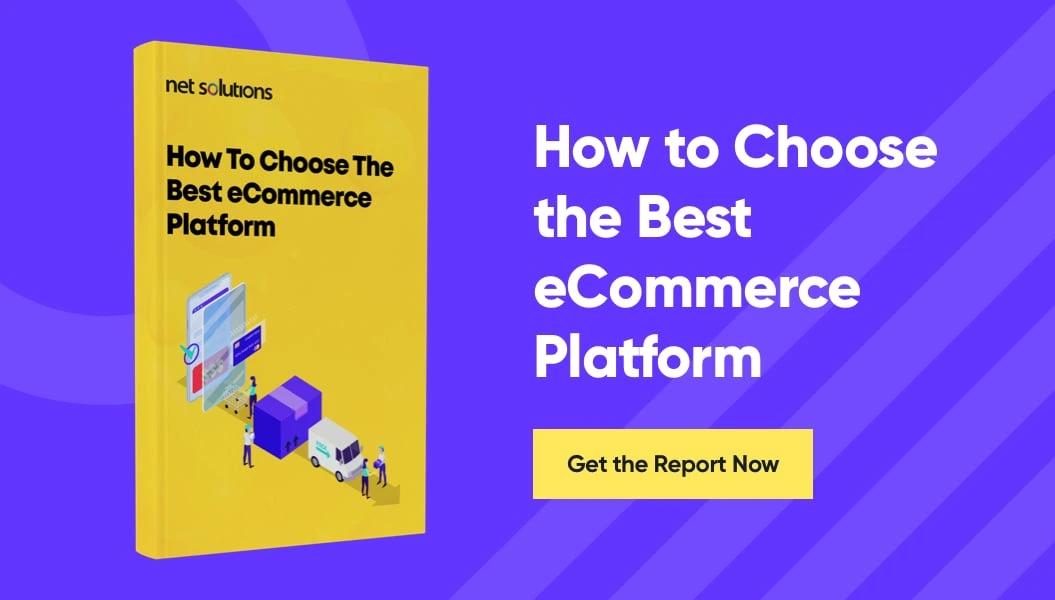
We respect your privacy. Your information is safe.
Things to Consider While Choosing a B2B eCommerce Platform
B2B buyers demand similar shopping experiences to those of B2C eCommerce websites. They research online, use mobile touch-points like smartphones and tablets, and expect detailed product content. It’s more than just having the most suitable products and the lowest prices. Buyers are searching for the best online experience.
Here are some essential things you should keep in mind while choosing an eCommerce platform for your B2B eCommerce website:
1. Is The Platform Hosted On-Premise or On The Cloud?
Whether a B2B eCommerce platform is hosted on-premise or on the cloud can significantly impact your business’s operation and management.
An on-prime hosted platform can offer you complete control over data as it runs on your own servers. But it would also require significant upfront investments in hardware and IT resources and ongoing maintenance costs.
On the other hand, Cloud-hosted B2B eCommerce platforms require low upfront costs and less expensive infrastructure and IT resources as a vendor on the Cloud hosts them. However, you may need more control over data and may have to rely on vendors with your sensitive information.
On-premise hosting platforms are helpful for businesses with strict data privacy or regulatory requirements. If these things are not of concern to you, you can opt for a cloud-based B2B eCommerce platform. Ultimately, the decision will depend on a business’s specific needs, budget, and preferences.
2. Is The Platform Open-Source?
An open-source eCommerce platform gives you access to modify the platform’s code. It gives you endless creative freedom when designing and configuring your B2B website. It is good to have complete management to streamline and customize the development process if you have app developers in-house.
For example, Magento is one of the excellent examples of B2B eCommerce platforms you can download, self-host, and customize.
3. Pre-Built Templates
Pre-built templates in a B2B eCommerce platform are essential because they offer a quick and cost-effective way to launch an online store.
With pre-built templates, you don’t have to spend time and resources designing and developing a custom website from scratch. Instead, you can choose a template that fits your brand and style and customize it to meet your business needs. As a result, you can launch your online store faster, with less hassle and lower costs.
Besides, prebuilt templates can:
- Offer consistency and structure to help businesses create a professional and user-friendly online store.
- Help you streamline your sales processes and provide a better customer experience as these templates are built with B2B commerce in mind.
4. Business Requirements
Business requirements are essential in choosing a B2B eCommerce platform. They can help you decide which platform will best meet the unique needs of a business.
Here are a few aspects that you must keep in mind while evaluating B2B eCommerce platforms based on business requirements include:
- What products or services does your business offer? Does the platform support those offerings?
- What payment methods do you accept? Does the B2B eCommerce platform support those offerings?
- Does the B2B eCommerce platform allow integration with other systems like CRM or ERP to ensure smooth workflow?
- Does the platform offer a user-friendly experience for customers? Is the user interface straightforward, and is the checkout process fast and reliable?
- Can the eCommerce platform handle increase traffic and sales?
- Does the platform offer robust security features and meets industry standards?
- Is the B2B eCommerce platform within your budget? If not, are there any customization plans to accommodate your budget requirements?
By carefully evaluating their business requirements, you can choose a B2B eCommerce platform that your business needs and offers a solid foundation for online sales.
5. Purchase Related Requirements
As a B2B eCommerce website, you must clearly define your purchase-related requirements. A B2B buyer usually places a bulk order, requiring specific features to make it a secure and frictionless experience.
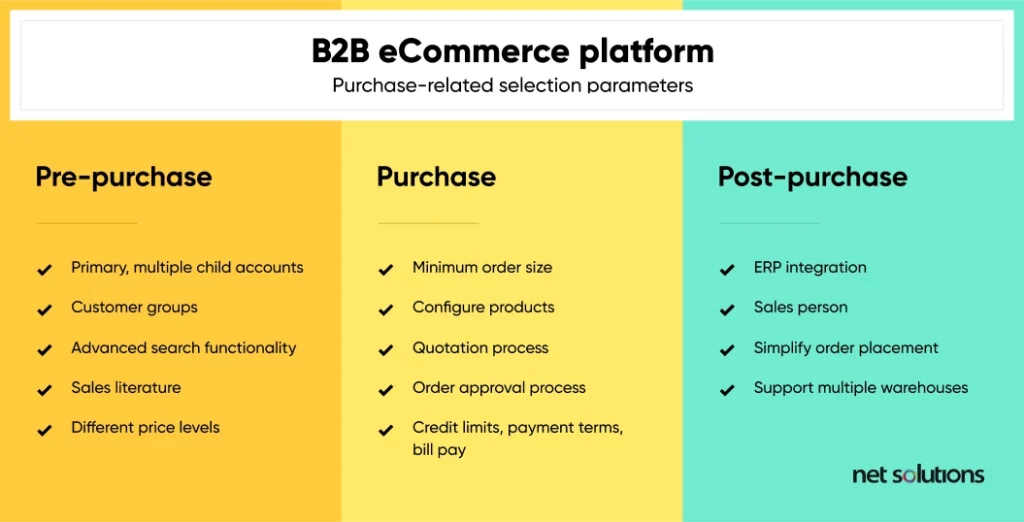
B2B purchases are different from B2C purchases; therefore, B2B eCommerce websites require more features to make it easy for sellers and buyers to communicate through the B2B website. These features can be divided into the eCommerce customer journey categories: pre-purchase, purchase, and post-purchase.
Pre-Purchase
Analyze if your B2B eCommerce Solution provider will offer an option for:
- Creating a parent account – Creating a primary account with multiple child accounts. The child accounts should further enable permissions, credit limits, workflow, etc.
- Creating customer groups – You should be able to set attributes specific to a group, such as pricing, minimum order quantity, etc.
- Creating Advanced Search Functionality – Your customers should find the exact product and should not face difficulty because of the sophisticated product attributes.
- Sales Literature – Customers should be able to get information such as product features, technical specifications, product images, etc. The platform should also support various media types, such as PDFs, videos, images, etc.
- Different Price Levels – The platform should allow you to define different price levels depending on customer groups, order quantity, order history, payment terms, etc.
Purchase
- Minimum Order Size – There should be an option to install (at customer group or product level) and order (during order placement) the minimum order quantity.
- Configure Products – Customers should provide a tool to configure products and even update prices based on selected configurations.
- Quotation Process – There should be an option for creating, modifying, and approving the quotes online.
- Order Approval Process – The approval of orders should come from parent accounts, whereas child accounts can only initiate the orders.
- Credit Limits, Payment Terms, Bill Pay – There should be an option to settle pending invoices (across accounts) through a single payment or multiple payments.
Post-Purchase
- ERP Integration – A seamless eCommerce and ERP integration, although not mandatory, can still be asked. Automate and streamline order fulfillment and improve customer experience by making the correct information available across systems.
- Salesperson – Your salesperson can access information to address customer queries, add customers, create or update orders, check order status, etc., through a sales portal-like functionality.
- Simplify Order Placement – Customers should be allowed to save shopping carts or lists for future use, making it easy for customers to repeat one of their previous orders.
- Support Multiple Warehouses – The platform should be extensible to support fulfillment from multiple warehouses.
6. Security
Security is a critical factor to consider when choosing a B2B eCommerce platform. B2B transactions often involve sensitive information like financial data, confidential business information, and employees’ personal information. You would certainly want it to stay in the right hands.
Besides, B2B companies also have a legal obligation to protect the privacy of their customers’ data as per privacy regulations like the European Union’s General Data Protection Regulation (GDPR).
Therefore, when choosing a B2B eCommerce platform, you must consider the security measures it has in place, such as:
- Encryption
- Secure socket layer (SSL) certificates
- Data backup and recovery
- Compliance with industry security standards (PCI-DSS)
7. Cost
Only some B2B companies have unlimited budgets to spare for technology investments. Hence, they must be careful where they spend their money.
Here are a few questions you must ask before choosing a B2B eCommerce platform for your business:
- What’s the total cost of ownership?
- Are any hidden costs involved, such as transaction fees, custom development costs, and ongoing maintenance costs?
- How much is the potential return on investment?
- Can the platform scale as your business grows?
Answering these questions would help you choose a B2B eCommerce platform that’s affordable and offers a good return on investment.
8. Support and Resources
B2B eCommerce platforms have a lot of complexities involved. Many users need help navigating through the platform. Besides, some businesses would also want to make the most out of the platform.
Hence, while choosing a B2B eCommerce platform, it is essential to consider the level of support and available resources, including technical support, user support, documentation, training, and community. It would help you ensure businesses can use the platform effectively without facing any issues.
Factors that Your Choice of B2B eCommerce Platform can Influence
1. Website Maintenance
Choosing a hosted and on-premise B2B eCommerce platform means you have to maintain your website. You will have to manage and pay for your servers, deal with broken software code, and fix any site-related problems that may occur.
Cloud-based platforms typically set up and host your eCommerce site for you. If the software requires an update, they will do it automatically. If your website crashes, it is their responsibility to fix it and monitor your website’s performance 24×7.
The type of platform you want for your business entirely depends upon how you want to manage your added responsibilities.
2. PCI Security
PCI compliance is a must for top B2B eCommerce websites. It is a way to ensure that customers’ payment card information is secure while making a purchase.
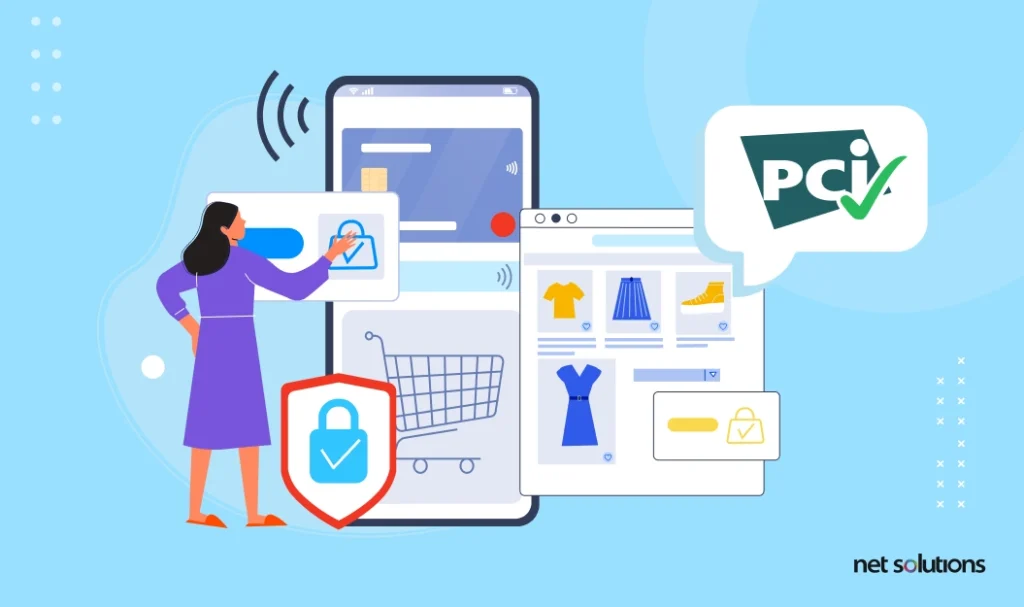
The eCommerce platform you choose will decide whether it is your responsibility or of the third-party team to develop and maintain the website. Some cloud-based platforms provide this security for their clients because the data is on their servers. They are responsible for managing it.
The client ensures that all PCI compliance requirements are satisfied for other hosted solutions. You’ll have to make sure at your end that payment gateways meet industry standards.
3. Cost Acquired
A hosted solution will cost you more with the software’s license fee, maintenance costs of server hosting, development costs, and the in-house IT team costs.
A fully-hosted, cloud-based SaaS or PaaS platform typically requires a monthly fee for hosting, security, maintenance, and support. It will lessen your overall operating costs.
B2B eCommerce Features: What to Look for in a B2B Platform?
B2B eCommerce trends, requirements, and challenges differ significantly from B2C in the purchase patterns, order values, volumes, and processes.
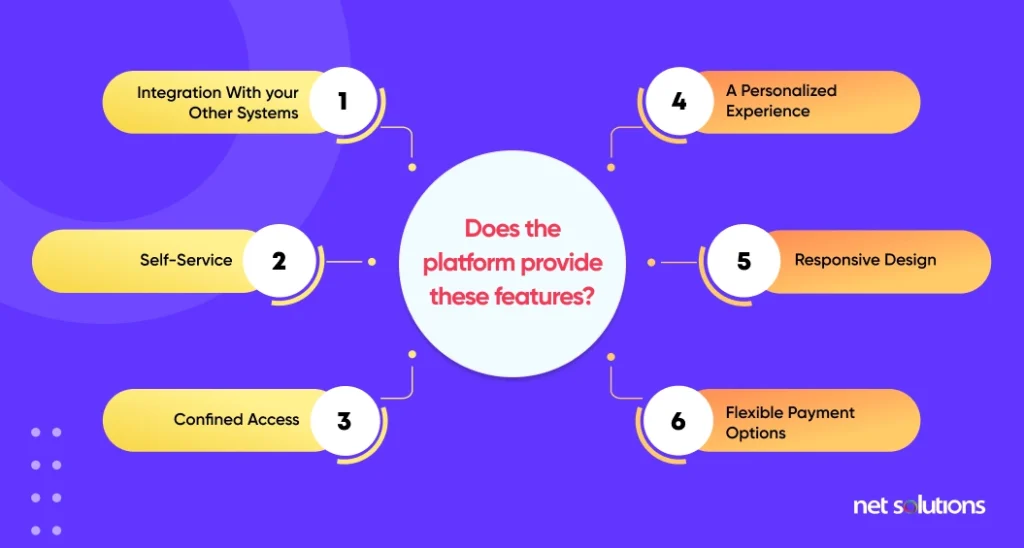
For seamless customer experience, an ideal B2B eCommerce platform should provide the following features:
1. A Personalized Experience
Customized B2B catalog management is presumably the most distinct and notable among B2B eCommerce features. It empowers sellers to customize product lists for companies, business units, divisions, and individual buyers or customers.
73% of B2B execs say that customer expectations for personalized experiences are significantly higher today than just a few years ago.
B2B eCommerce stores often fail due to their rigidity and are designed based on a standard template. When it comes to the requirements of the business, there is no one-size-fits-all. The best B2B eCommerce platform for you is the one that fits your business requirements and allows you to provide a customized experience instead of just designing based on templates.
2. Responsive Design
This functionality is not specific to just B2B platforms. Every eCommerce platform should support responsive design for rendering your web content correctly across multiple devices. New-age buyers like to hop across different methods during the purchase process, and this functionality allows for such buying behavior.
3. Flexible Payment Options
B2B transactions are complex, and making them easy requires a lot of advanced functionality, which is outside the typical B2C eCommerce experience. The challenge and urgency lie in delivering a B2C-like shopping experience with sleek site design and functionality for large catalogs and segmented pricing.
Flexible payments, one of the essential features of B2B Digital Commerce Platforms, result in a user experience. While offering different payment methods and installment strategies, ensure that offline payment options are also available with online options such as Credit cards, NEFT, IMPS, RTGS, etc.
4. Restricted Access
Some B2B businesses enable pre-registered customers or sellers to order products from their online shops or stores. For example, if your company sells through a network of vendors, your site should be designed so approved sellers can access it.
Ensure that your eCommerce platform is secured with a password and only offers restricted access to customers. You can even limit access to specific parts of the site to unregistered customers, meaning the landing page and product list are accessible to everybody.
5. Self-Service
The self-service purchasing functionality is a massive advantage in B2B eCommerce. B2B buyers require the necessary information for deciding on their preferred product/solution before purchasing shipping information, quote approvals, etc. Ensure that the platform enables your eCommerce website to deliver the above features.
6. Integration With your Other Systems
In addition to platform types or features, integration is also an essential factor to consider before choosing a B2B eCommerce platform. It should integrate effectively with your other systems to ensure harmonious working between your online and offline channels.
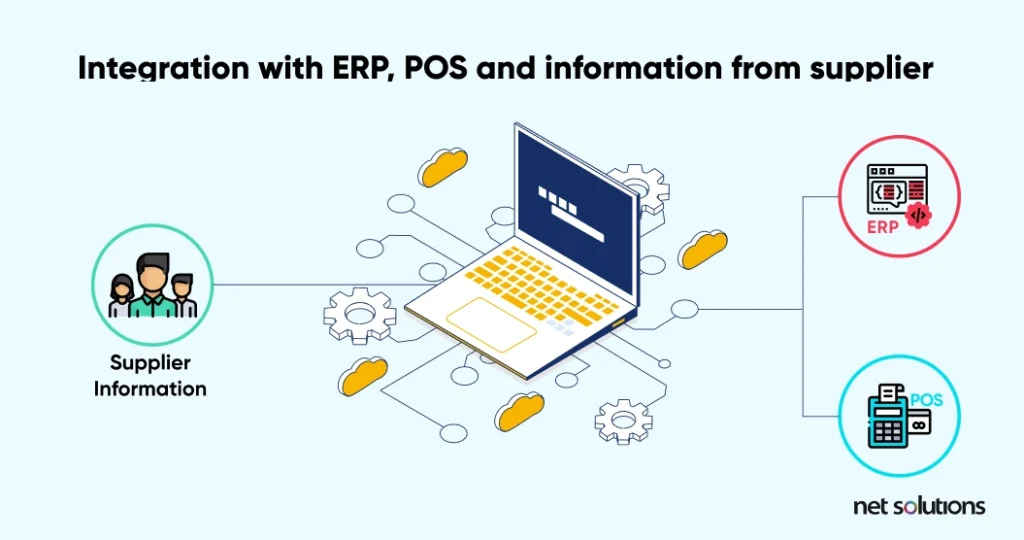
A well-integrated website will make you a more efficient multi-channel seller and result in a better customer experience.
While evaluating different platforms, analyze how they will work with your ERP or POS system. Ask yourself, “Will your platform handle information that comes through your suppliers?
Not all eCommerce platforms are easy to integrate; some are easier to incorporate. Choosing a cloud-based platform with a robust API will be easier to organize than a self-hosted solution.
Some providers will integrate all your systems for centralized order and inventory management.
Ask your B2B eCommerce platform provider about integration beforehand to save time and money. Don’t make the mistake of investing in an entirely new eCommerce platform only to find out later that it can’t integrate with your ERP.
While mentioned above were essential B2B eCommerce features you look for before choosing a platform, let’s now see some of the crucial questions that will help you make an informed decision.
7. Mobile Compatibility
Mobile devices are increasingly used for business purposes, including making purchases and accessing information. Hence, a mobile-compatible platform can help you reach customers and clients where they are, regardless of whether they are at their desks or on the go.
A mobile-compatible B2B eCommerce platform can also offer a better user experience for customers, making it easier for them to find what they need, place orders, and access information. This can further boost sales and increase your productivity. That’s why having a mobile-compatible B2B eCommerce platform is critical.
8. Analytics and reporting
Analytics and reporting can provide valuable insights into the performance of a B2B eCommerce platform, such as which products are selling well, what customer segments are most active, and where traffic is coming from. This information can help businesses make informed decisions about their products, marketing, and sales strategies.
With this information, you can make data-driven decisions as you better understand customer behavior, improving customer experience and increasing loyalty. You can also save time that you otherwise have to spend on generating reports and become more productive. Therefore, having robust analytics and reporting capabilities in a B2B eCommerce platform is essential.
A Few Questions to Ask While Choosing a B2B eCommerce Platform
The more questions you ask, the more clarity you will get about what you will receive from the provider.
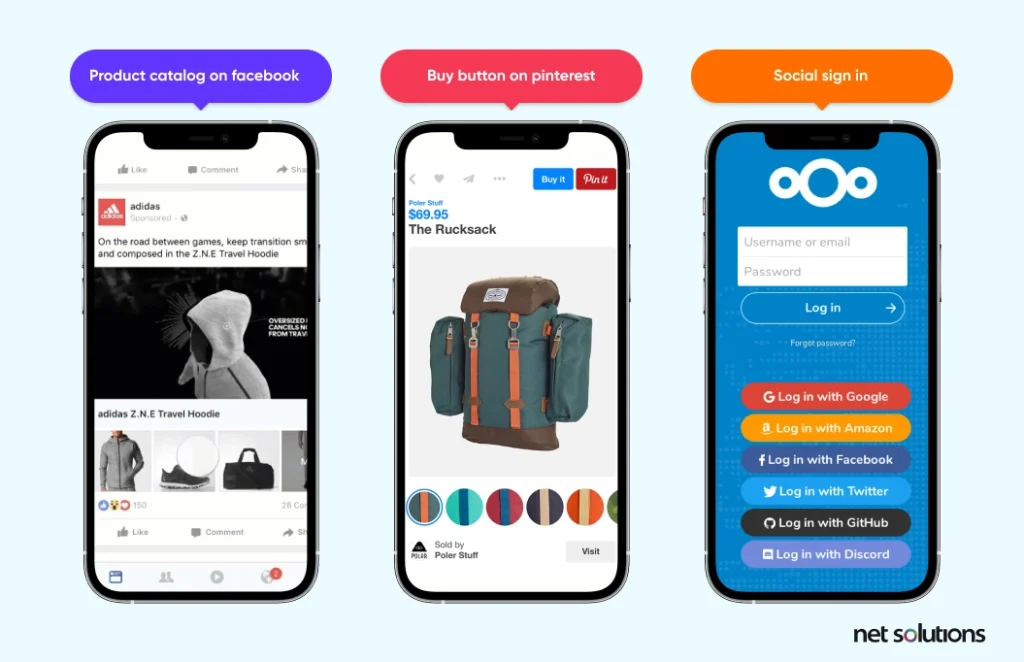
Some important questions that you should ask about social media
- Is there an option for publishing our product catalog on Facebook Shop? If yes, then will it be charged additionally?
- Will the users check out from within Facebook, or will they be redirected to our B2B store?
- Is there any support for Pinterest buy buttons?
- Is there any support for shopping on Instagram?
- Are Open Graph Tags included in the product metadata?
- Are social media sharing links supported on PDP?
- Will social media sharing links be displayed post-purchase?
- Will customers be able to log in to our storefront via social logins such as Facebook, Amazon, Google, etc.?
- We want to display user-generated content such as Pinterest or reviews. How will that be done?
Some important questions that you should ask about catalog management
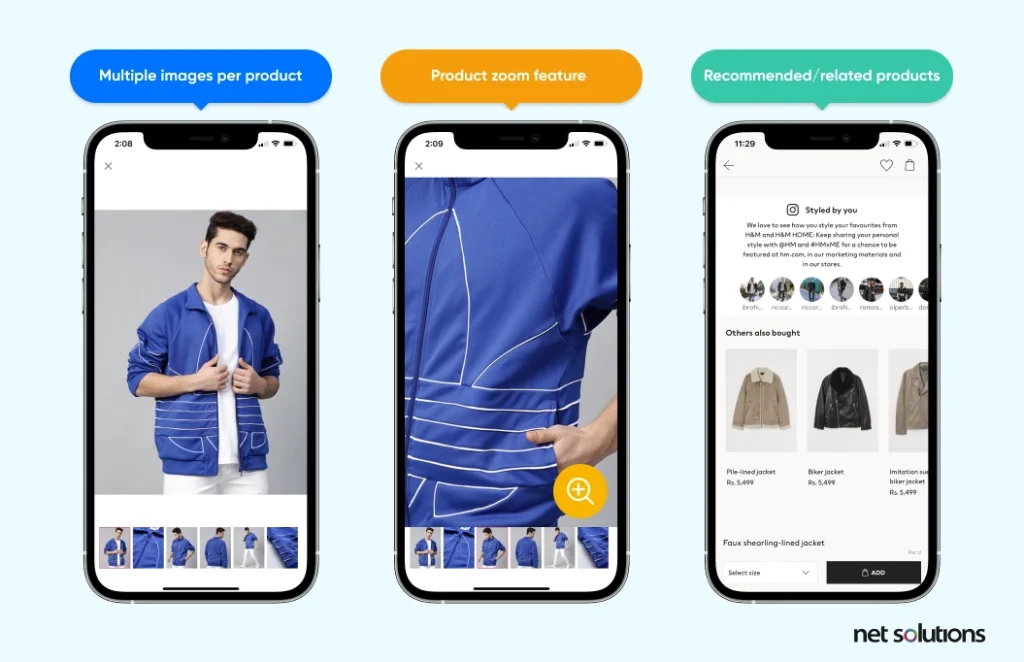
- How will we manage our product catalog within your system?
- How are the catalog and customer data imported/exported?
- What are the product catalog preview options? Can it be previewed in any theme for free, or will we have to purchase it?
- Can multiple images be added per product? Is there any specific limit to the number or size of images
- Can videos be added to PDP? If yes, then how easy/difficult is it?
- Is there a specific limit on the size and length of videos that can be uploaded?
- How are product options and option sets managed in your platform?
- How are variations or options configured?
- Do you provide a quick edit option for modifying stock levels or pricing changes?
- Does your platform support both digital and physical products?
- Is there a built-in inventory management system?
- How is real-time inventory sync supported within multiple channels?
- Can we track inventory at the variation level?
- Is dimensional weight understood and supported by the shipping system?
- Can related items be configured?
- Can related items be automatically generated?
- Are pre-orders allowed?
- How are custom product pages supported? Is there an option to configure them per category?
- Will the product reviews be built-in?
- Can customers easily share products with their friends from the PDP?
- Is the site search predictive?
- Do you allow categories to be sorted manually in the control panel?
- Do you allow categories to be used for private sales?
- Are category filters supported?
- Will the categories and products have breadcrumbs?
- Will the Page/Product/Category URLs auto-generated?
- How can the product and category-level URLs be customized?
- Is there any support provided for multi-level category navigation?
Some important questions that you should ask about customer service:
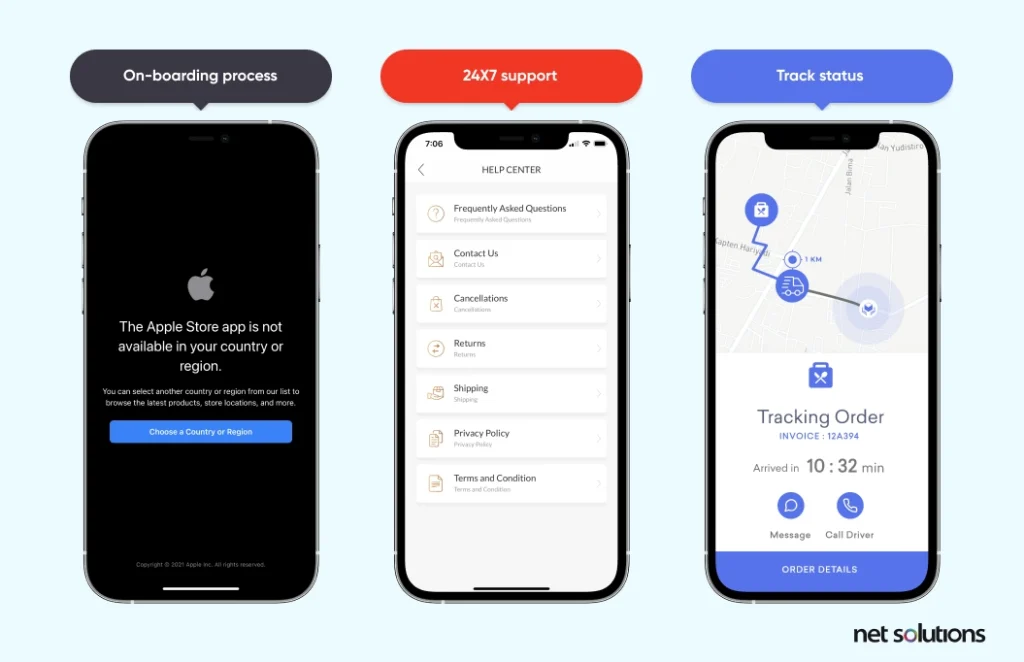
- What is your onboarding process for new clients?
- Can you share an example of an implementation timeline?
- Will training and user documentation be provided for the entire platform?
- What is your support process along with standard SLAs?
- What are your change management processes, such as system audit logging capabilities?
- How will our historical data (orders, customers, products) migrate to your solution?
- Can you share an example of a customer success plan offered by you to your customers?
- Can you extend support hours for an event’s onsite operation?
- How many customer support executives do you have, and where are they located?
- What is your phone support offering? Is it available 24/7? Is it charged additionally?
- What is the average wait/response time for phone support?
- How are urgent and time-sensitive requests handled? Are they prioritized?
- If needed, will we be provided with a dedicated support representative?
- Do you use a ticketing system? If yes, then which one? How can we follow the status of our tickets?
- What are your Support SLAs?
The Good and The Bad of Most Popular B2B eCommerce Platforms
1. Magento
The Forrester Wave named Magento as the best open-source B2B eCommerce platform. It helps B2B companies to enhance their customer experience and purchasing process. It is an all-in-one platform that offers built-in B2B functionality.
Magento can help you in achieving even the most challenging business goals. Big brands like Ford, Liverpool, Vizio, and Landrover trusted Magento for their website development.
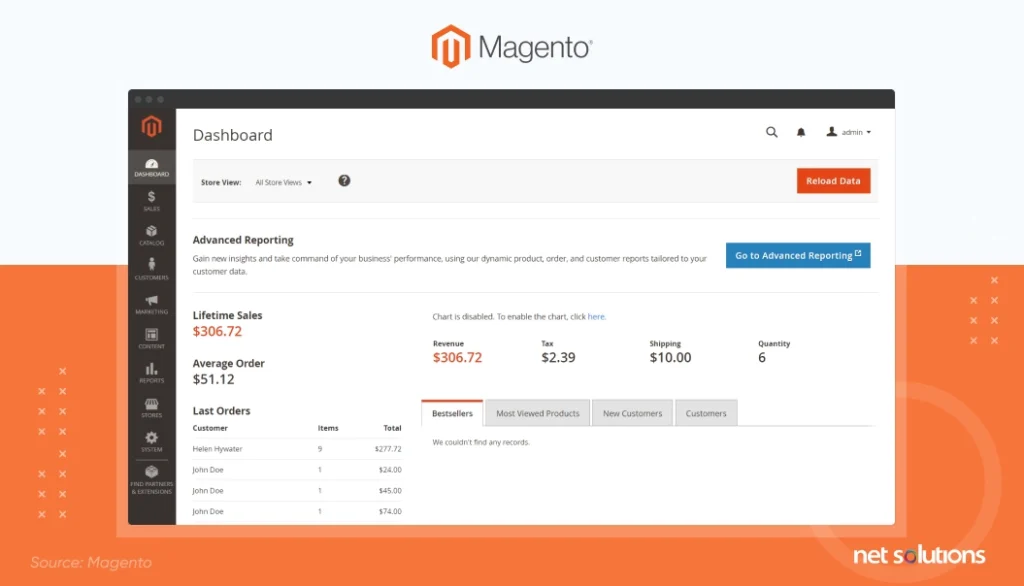
The Good
Magento Commerce (formerly Enterprise), being an industry leader, offers 100-inbuilt B2B features, including the following:
- Offers reliable and cloud-based eCommerce solution
- Provides extensive native B2B functionality
- Includes personalized buying experiences
- Provides the option of custom catalogs and pricing
- Robust merchandising
- Single platform for both B2B and B2C
- Easily integrates with backend systems
- Support of corporate accounts
- Friction-free ordering
- Capable of multi-channel selling
- Effortless management and detailed reporting
- Allows quoting and negotiations
- Optimized inventory and order processing
- With Magento, you can simultaneously manage both B2C and B2B e-stores, resulting in constant eCommerce web development of your business and an increase in profits.
The Bad
- Magento is only for some. It cannot be handled by someone who is not tech-savvy or a programmer and does not have an in-house team.
- The next disadvantage is the hefty price tag; the basic version is free. However, an enterprise version will cost you at least $20,000 annually. You will have to invest in third-party programming costs if you do not have a team of programmers.
The Verdict
Magento Development is the ideal eCommerce solution for enterprise-level web stores that possesses a vast amount of products. It is not recommended for small businesses because it is complex to set up, costs a lot, and requires highly-technical management.
2. Salesforce Commerce Cloud
Salesforce is a cloud-based eCommerce platform that more than 180 companies are using across the globe at present. Some big names include Adidas, Barneys New York, Brooks Brothers, Crocs, Ecco, FILA, Kate Spade, L’oreal, Lancome, New Balance, Panasonic, and more.
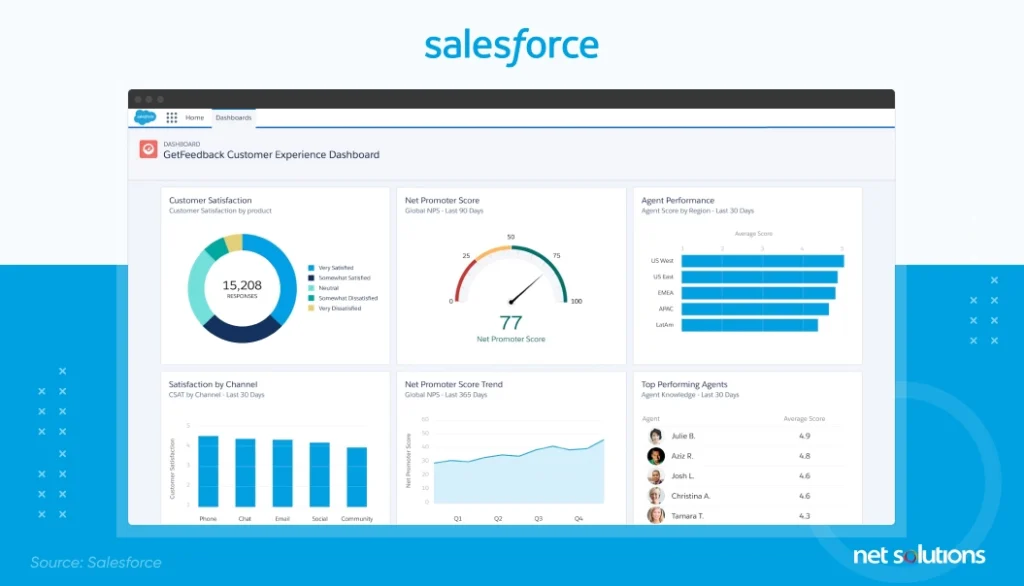
The Good
The following are the benefits that you will get as a B2B seller while choosing SalesForce as your B2B eCommerce solution:
- LINK partners can assist with design, marketing, merchandising, and many other value-added services
- Cloud-based platform mitigates the risk of lost data and is highly accessible
- The flexibility that allows for optimal speeds even at peak traffic times and built-in redundancies and disaster recovery solutions caused by high-traffic site crashes
- Responsive web design lets your site adapt to any device
- Advanced SEO and marketing tools, including customer segmentation and grouping capabilities
- Offers online classes and in-person training to instruct clients on using and managing their site
- 24/7 customer support included
- Oversees/monitors security and performance levels
The Bad
- Expensive for an eCommerce solution and also comes with additional costs. eCommerce businesses have to pay a commission or licensing fee for every sale.
- Much of the website’s control is in the hands of SalesForce and its partners.
- Imposes overage fees if you sell more than your contracted amount for the period.
The Verdict
Salesforce is ideal for large-sized, enterprise-level retailers who need an all-inclusive, customized B2B eCommerce solution. If you’re tech-savvy and understand your way around code, then the SalesForce system is the right solution. However, its real power lies in its unique LINK partner program. Through this program allows clients to select various value-added services to improve their B2B store.
3. Shopify Plus
Shopify, one of the leading eCommerce platforms, currently powers nearly a million online shops. Shopify Plus is presently being used by Citizen, Tesla, Motorola, Adidas, and L’Oreal, to conquer the B2B business.
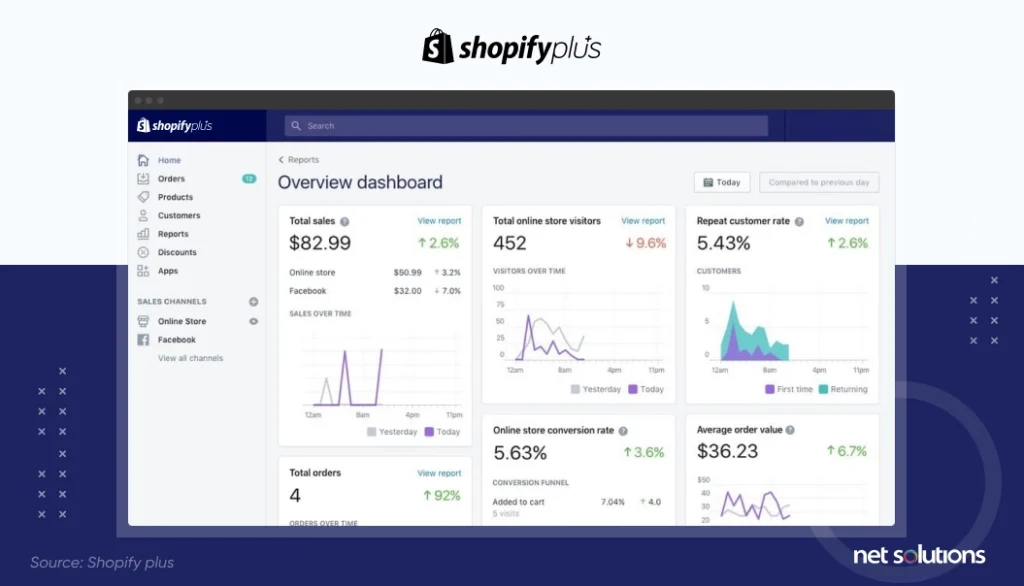
The Good
Following are the main advantages that you will get as a B2B merchant if you choose Shopify Plus:
- Can Launch multiple websites from a single backend or with different URLs
- Dedicated storefronts for global eCommerce
- 24/7 e-store performance
- 20 sales channels are integrated directly into merchants’ dashboard
- Offers advanced custom pricing capabilities
- Automated taxation is provided by integrating with Avalara
- Manages up to 8,000 orders per minute
- 1500+ built-in apps
- SSL Certificate (storefront and checkout)
The Bad
- The most prominent disadvantage is the additional transaction fee that is applied if you don’t use Shopify Payment.
- Shopify’s coding language, Liquid, requires clients to pay a total price for customization.
The Verdict
If you are a startup in the eCommerce business that needs a conventional eCommerce solution, then you can benefit from Shopify’s development. It is relatively easy to use and helps in decreasing the time-to-market. You can choose from various packages, from $29 to $299 per month, based on your needs and budget.
You can check out our comprehensive guide on Magento vs. Shopify to make a strategic business decision. Also, you can go through the Shopify vs. WooCommerce piece if you choose between Shopify and WooCommerce.
4. BigCommerce
BigCommerce currently claims to have over 90,000 online stores in 65 countries. Therefore, it is considered one of the best eCommerce platforms for B2B businesses. It has helped launch B2B online shopping sites of all sizes, from big names such as Martha Stewart and Toyota to many SMEs.
BigCommerce is a boon for entrepreneurs who don’t know how to run code and don’t have a team of programmers working for them. It offers a vast list of built-in features that prove very useful to non-tech-savvy people.
The Good
Here are some of the critical advantages provided by BigCommerce to B2B businesses:
- Stylish and responsive B2B eCommerce websites
- Simplified segmentation
- Discounted and custom pricing
- Integration with backend systems
- Access to B2B-specific payment solutions
- Quote builder integrations
- Per-unit cost and automatically applied volume discounts
- Quick re-orders
- Advanced shipping methods
The Bad
- In comparison to other eCommerce platforms, BigCommerce lacks support.
- It contains only seven free themes compared to other eCommerce platforms, which offer more than 20 free themes. However, one can always get a multitude of premium themes and many customization options to give their store a unique identity.
The Verdict
BigCommerce is perfect if you are looking for a full-fledged eCommerce store without the hassles of coding, integrating plugins, and other technical hurdles. Don’t mind spending some extra bucks on a premium theme? Then, BigCommerce is the go-to eCommerce solution.
5. PrestaShop
PrestaShop is one of the best B2B open-source software that enables a high degree of eCommerce personalization. The platform has a vast selection of subtle eCommerce themes, several world-class payment gateways, and in-built customer support tools that let businesses craft an outstanding web experience for b2b buyers.
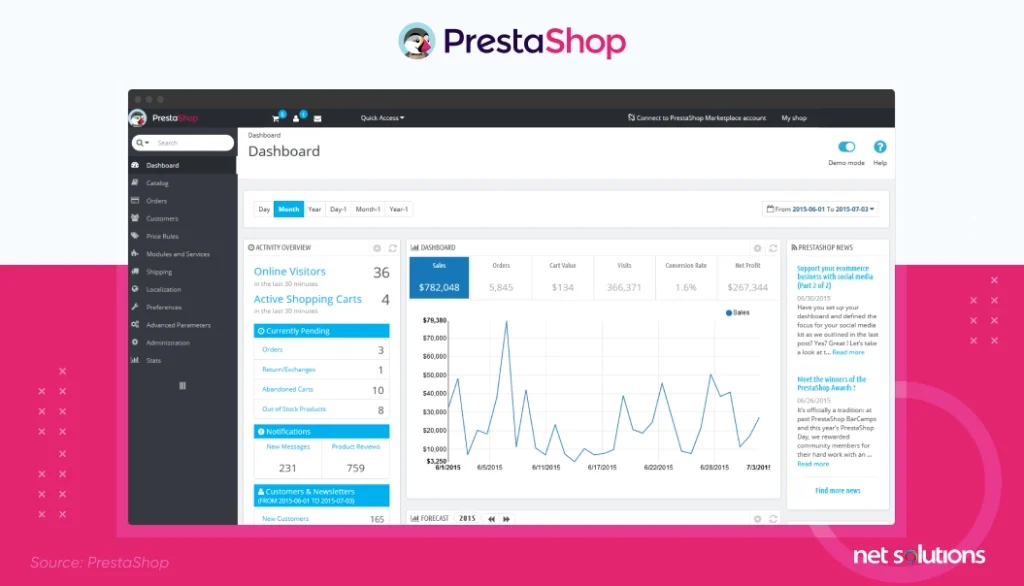
The Good
Following are the main advantages of using PrestaShop as your B2B wholesale platform:
- Free to download and easy to install
- Allow custom checkouts
- Minimum recurring cost
- Several customizable themes
- Several add-ons and third-party extensions
- Access to marketing reports & analytics
- Multiple currency support
- Global selling support
- Secure payments
The Bad
- Limited scalability
- No official support
- Expensive add-on modules
- High maintenance cost
The Verdict
Being an open-source B2B eCommerce platform, PrestaShop is the right choice for small scale B2B businesses. PrestaShop is a viable option if you are on a low budget and searching for something that helps you take your business online. However, it offers limited scalability options at a high price.
Frequently Asked Questions
- Manufacturing and Wholesale
- Information Technology and Services
- Healthcare and Pharmaceuticals
- Construction and Building Materials
- Energy and UtilitiesTransportation and Logistics
- Agriculture and Food Processing
- Chemicals and Plastics
- Financial Services
- Telecommunications
- Subscription-based models: Charging customers a recurring fee for access to products or services.
- Commission-based models: Earning a commission for facilitating transactions between buyers and sellers.
- Advertising: Generating revenue by displaying ads on their platform.
- Sales of products and services: Selling goods and services directly to business customers.
- Premium features: Offering additional features for a fee, such as premium accounts or upgraded services.
- Licensing: Licensing software or other intellectual property to other businesses.
- Consultancy and professional services: Offering consulting or professional services to business clients.
- Wholesale and distribution
- Manufacturing
- Printing and Custom Products
- Health and Beauty
- Food and Beverage
- Home Goods and Furniture
- Fashion and Apparel
- Electronics and Technology
- Sports and Outdoors
- Automotive and Parts.
Etsy is a C2C (Consumer-to-Consumer) e-commerce platform allowing individuals and small businesses to sell handmade, vintage, and unique goods to consumers.

